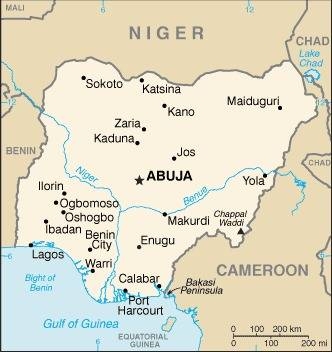215 Nigeria

Three equal vertical bands of green (hoist side), white, and green. The color green represents the forests and abundant natural wealth of the country, white stands for peace and unity.
Flag courtesy of the CIA World Factbook

Map courtesy of the CIA World Factbook

Yoruba copper mask of Obalufon from the city of Ife c. 1300
Government
According to Britannica, under the 1999 constitution, executive power is vested in a president who serves as both the head of state and the chief executive, is directly elected to a four-year term, and nominates the vice president and members of the cabinet. The constitution provides for a bicameral National Assembly, which consists of the House of Representatives and the Senate. Each state elects 10 members to the House of Representatives for four-year terms; members of the Senate, three from each state and one from the Federal Capital Territory, also are elected to four-year terms.
There are two tiers of government, state and local, below the federal level. The functions of the government at the local level were usurped by the state government until 1988, when the federal government decided to fund local government organizations directly and allowed them for the first time to function effectively.
Nigeria is divided into 36 states and the Federal Capital Territory, where the country’s capital, Abuja, is located; the constitution also includes a provision that more states can be created as needed. At independence the country was divided into three regions: Northern, Eastern, and Western. The Mid-West region was created out of the Western region in 1963. In 1967 Col. Yakubu Gowon, then the military leader, turned the regions into 12 states: 6 in the north, 3 in the east, and 3 in the west. Gen. Murtala Mohammed created an additional 7 states in 1976. Gen. Ibrahim Babangida created 11 more states, 2 in 1987 and 9 in 1991, for a total of 30. In 1996 Gen. Sani Abacha added 6 more states.
The Nigerian legal and judicial system contains three codes of law: customary law, Nigerian statute law (following English law), and Sharīʿah (Islamic law). Customary laws, administered by native, or customary, courts, are usually presided over by traditional rulers, who generally hear cases about family problems such as divorce. Kadis (judges) apply Sharīʿah based on the Maliki Islamic code. Since 1999, several states have instituted Sharīʿah law. Although the states claim that the law applies only to Muslims, the minority non-Muslim population argues that it is affected by the law as well. Christian women, for example, must ride on female-only buses, and some states have banned females from participating in sports.
Nigerian statute law includes much of the British colonial legislation, most of which has been revised. State legislatures may pass laws on matters that are not part of the Exclusive Legislative List, which includes such areas as defense, foreign policy, and mining, all of which are the province of the federal government. Federal law prevails whenever federal legislation conflicts with state legislation. In addition to Nigerian statutes, English law is used in the magistrates’ and all higher courts. Each state has a High Court, which is presided over by a chief judge. The Supreme Court, headed by the chief justice of Nigeria, is the highest court.
Nigerian Civil Aviation Authority (NCAA)
Nigerian Civil Aviation Authority (NCAA) is the regulatory body for aviation in Nigeria. It became autonomous with the passing into law of the Civil Aviation Act 2006 by the National Assembly and its assent by the President of the Federal Republic of Nigeria. The Act not only empowers the Authority to regulate Aviation Safety without political interference but to also carry out oversight functions of Airports, Airspace, Meteorological Services, etc as well as economic regulations of the industry.
Airspace
SkyVector – Google Maps – ADS-B Exchange
ICAO countries publish an Aeronautical Information Publication (AIP). This document is divided into three parts: General (GEN), En Route (ENR) and Aerodromes (AD). ENR 1.4 details the types of airspace classes they chose to adopt from classes A through G.
Drone Regulations
RPAS – Part 21 – 2023
Advanced Air Mobility (AAM) Regulations & Policies
None found by the author.
However, should you, the reader, happen to stumble across something to the contrary, please email the author at FISHE5CA@erau.edu and you may be mentioned in the ACKNOWLEDGEMENTS section of this book by way of thanks for contributing to this free eBook!
Advanced Air Mobility (AAM) News
2025
Video courtesy of Advanced Air Mobility Institute from the July 2025 Global AAM Forum.
Short Essay Questions
Scenario-Based Question
You have been hired by a Drone Startup Company. Your boss has immediately assigned this job to you.
They need you to prepare a one-page memo detailing the legalities of using a drone to film in Nigeria.
They need you to mention any national laws and local ordinances.
They specifically want to know what airspace (insert pictures) you will be operating in and whether or not you need an airspace authorization.
Does it matter whether or not you are a citizen of the country?
Lastly, there is a bonus for you if, as you scroll through this chapter, you find any typos or broken links!
Short Essay Questions
- What are the drone categories?
- How is registration addressed?
- How is remote ID addressed?
- What are the model aircraft rules?
- What are the commercial drone rules?
- Are there waivers or exemptions to the rules? If so, for what?
- Would you share a link to an interactive airspace map?
- How is BVLOS addressed?
- How can you fly drones at night?
- How can you fly drones over people?
- Where do you find drone NOTAMs?
- What are the rules for drone maintenance?
- What are the rules for an SMS program?
- What are some unique rules not mentioned above?
- What are the C-UAS rules?
- What are the AAM rules?

